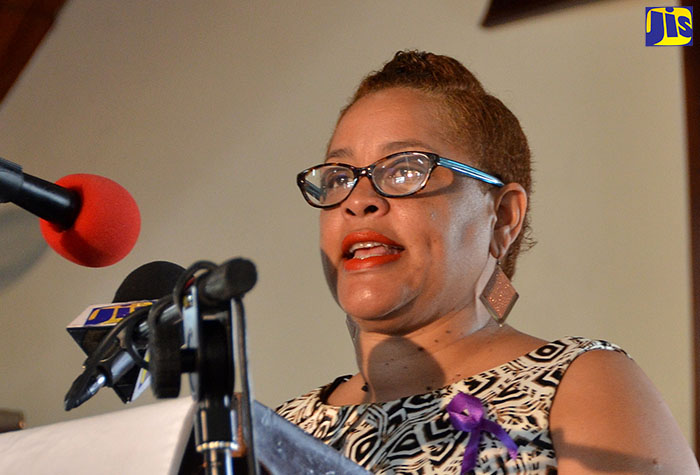Gov’t to Begin Implementing Gender-Based Violence Action Plan in 2017
By: , November 23, 2016The Key Point:
The Facts
- The plan, for which a draft has been completed, is designed to prevent gender-based violence, improve the implementation of laws and services aimed at protecting victims as well as provide adequate support services for survivors.
- Police statistics for 2014 showed that 2,199 cases of abuse were reported, but Ms. Grange noted that many other acts of violence went unreported.
The Full Story
The Government will commence implementation of the proposed National Strategic Action Plan to Eliminate Gender-based Violence in 2017.
Culture, Gender, Entertainment and Sport Minister, Hon. Olivia Grange, made the disclosure in a message delivered by Permanent Secretary in the Ministry, Alison McLean, during Sunday’s (November 20) church service to mark International Day for the Elimination of Violence against Women, held at the Tarrant Baptist Church in St. Andrew.
The plan, for which a draft has been completed, is designed to prevent gender-based violence, improve the implementation of laws and services aimed at protecting victims as well as provide adequate support services for survivors.
It also aims to standardise protocols for effective data-collection tools in order to capture the scope, trends and patterns of incidents to improve future planning and programming.
The plan further emphasises the need for strategies aimed at protecting vulnerable groups such as women and girls, the majority of whom are victims of violence and abuse.
It also seeks to ensure the protection of underserved communities as well as persons with disabilities and other key populations.
Ms. Grange noted that the move to implement the plan is indicative of the Administration’s seriousness about tackling the issue of violence against women and girls, emphasising that “it is high on our agenda”.
She pointed out that the Government has been proactive in enacting several pieces of legislation to address the issue.
These include the Sexual Offences Act; Offences Against the Person Act; Trafficking in Persons (Prevention, Suppression and Punishment) Act; Child Pornography (Prevention) Act; Child Care and Protection Act; and the Cybercrimes Act.
The Minister, however, emphasised the need for civil society to provide support “to ensure that every woman and girl is guaranteed their rights as human beings, which includes protection from violence”.
Police statistics for 2014 showed that 2,199 cases of abuse were reported, but Ms. Grange noted that many other acts of violence went unreported.
She noted that too many members of society are focused on shaming victims into believing that their misfortune is their fault and problem, instead of empowering them to speak out, stand up to and confront their attackers.
“It is time we understand that the violence not only has long-lasting consequences for women but also their families, the community, and the country at large. It is attitudes and outdated beliefs that fuel gender-based violence. If we treat each other how we want to be treated ourselves, then we will effectively tackle this problem,” she added.
In noting that violence remains a “major factor of life” for many women globally, Ms. Grange said the United Nations Entity for Gender Equality and the Empowerment of Women (UN Women) estimates that 35 per cent of females have either experienced physical and/or sexual intimate partner or non-partner abuse.
This, she pointed out, equated to one in every three women. “We are all vulnerable and we each have a responsibility to end the violence,” Ms. Grange said.
She is encouraging members of civil society to use the International Day for the Elimination of Violence against Women on November 25, and the ensuing 16 days of activism, to “make a stand against violence and the protection of our women and children”.



